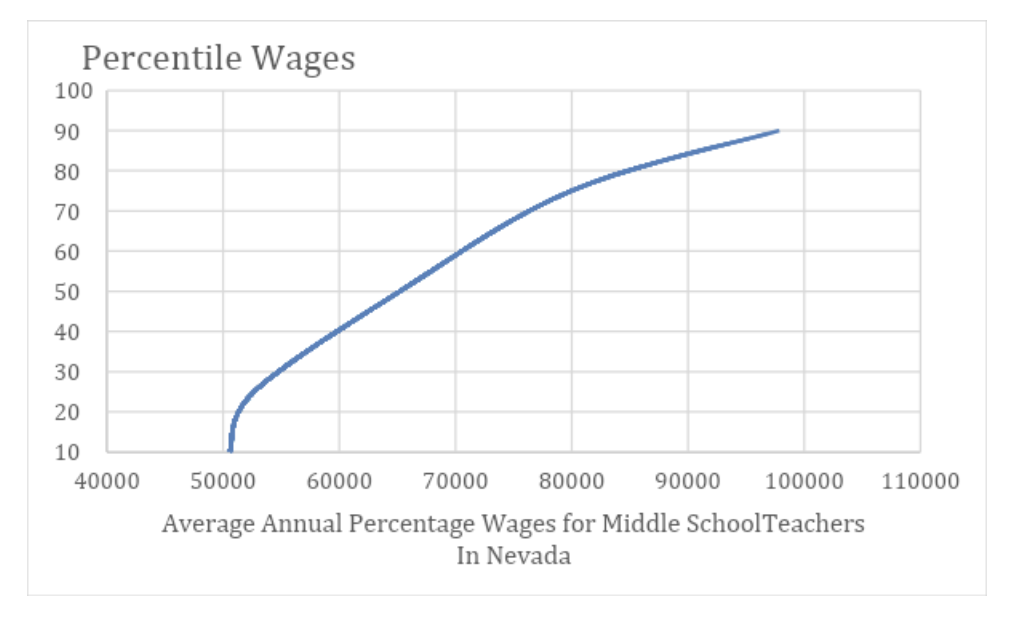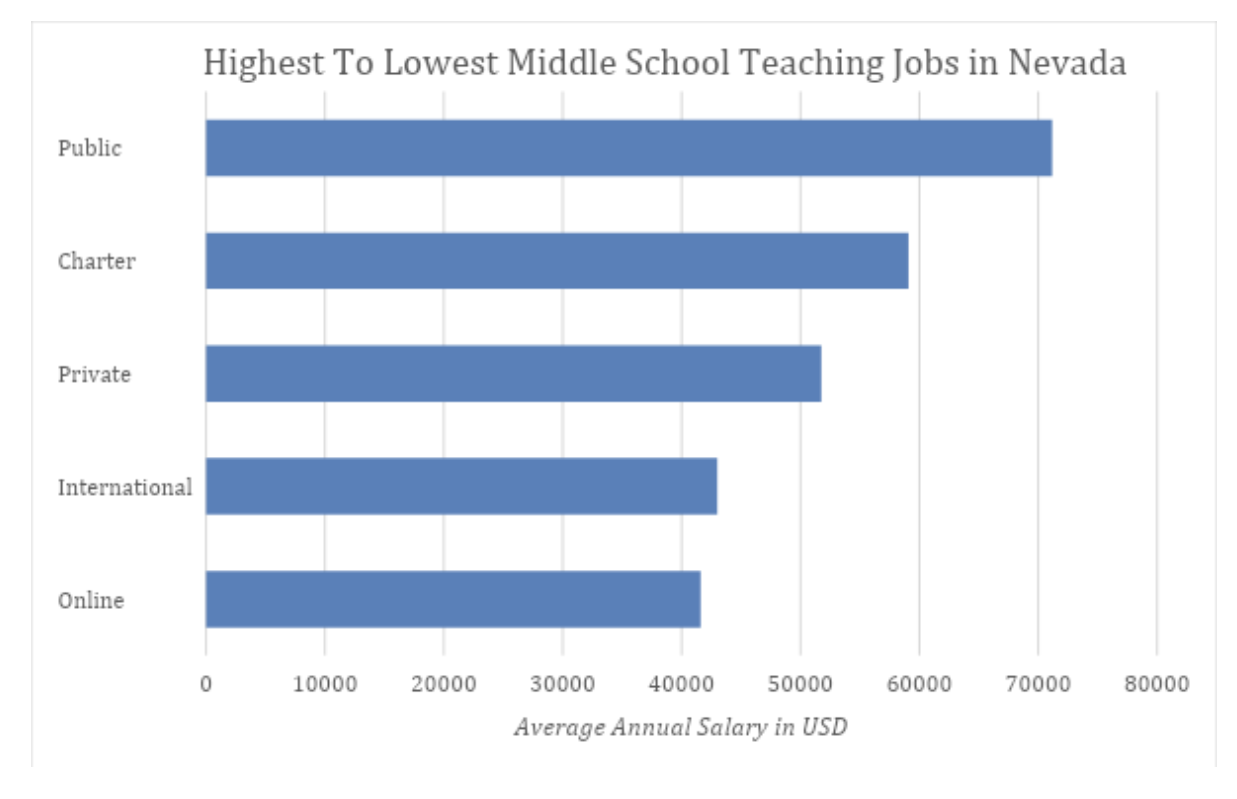Middle school teachers are educational professionals who embrace the challenge of helping their students transition out of childhood and into teenagers. It is a period full of variety, swinging hormones, and excellent wit. Nevada hopes to attract more dynamic individuals into this rewarding and enriching vocation. You could be the difference in a child’s life.
The average annual middle school teacher salary as of May 2023 in Nevada is $71,170. Salary ranges can vary widely depending on the city and many other important factors, including education, certifications, additional skills, and the number of years you have spent in your profession.
In this guide, Teachers of Tomorrow highlights Nevada’s salaries for middle school teachers. We’ll also share the pathways to becoming a middle school teacher, including alternative teacher certification options.

What Is a Middle School Teacher?
Middle school teachers in Nevada work with grades 5-8, with students typically between 11-14 years old. Teachers of this age group are tasked with helping students transition from an elementary-style education into a high school framework and responsibility.
As middle schoolers progress through the grades, their classroom style and breadth of subjects expand. They begin with a similar framework to elementary, often having a primary classroom teacher responsible for teaching most subjects. In the later grades, they switch classes more and are instructed by teachers specializing in that subject area.
Regardless of grade level, middle school teachers have a background in a specialty area, such as English, math, sciences, and social studies. In addition, they generally have studied elementary or secondary education.
Excellence in the education profession has many faces and personalities. However, successful middle school teachers have some shared traits, including the following:
- Sense of humor: Being able to laugh is a must to enjoy teaching this unique age. Middle schoolers adore jokes and sarcasm. They also respect witty adults who can poke fun at themselves and see the lighter side of a situation.
- Empathetic: Middle school students are going through significant emotional and physical changes. These spark many feelings that, from an adult’s perspective, may not seem that big of a deal. However, these emotions and inner turmoil are real to the students and require validation and patience.
- Adaptable: Middle schools are a constantly fluctuating environment. Moods shift, unexpected events occur, and attentions wane. Successful educators are masters at shifting with the changes. They will modify instruction and explanations on the spot to maintain a connection with their students.
- Confidence: Middle schoolers have little respect for adults who come across as uncertain, insecure, and bashful. Successful educators in this age group must project an air of self-assuredness. However, this should not be confused with arrogance or never admitting when you are wrong. A confident educator is truthful about their mistakes while maintaining leadership.
Middle school teachers have numerous responsibilities within their classrooms. These include:
- Designing engaging lesson plans that align with state and school district standards.
- Creating a safe, accepting, and productive classroom environment.
- Assessing student assignments and classroom participation and providing meaningful feedback that helps them grow.
- Communicating with colleagues, parents, and other essential role players to ensure the school and students’ needs are met.
How Much Do Middle School Teachers in Nevada Make?
The average annual salary for middle school teachers in Nevada as of May 2023
according to the Bureau of Labor Statistics:
- Highest salary – $85,210
- Average salary – $60,670
- Lowest salary – $46,950
Nevada middle school teachers’ salaries vary, depending on the years of experience, education level, certifications, and the school district’s local funding.

How to Become a Middle School Teacher in Nevada
Regardless of grade level, middle school teachers typically have a background in a specialty area, such as English, math, sciences, and social studies. In addition, they generally have studied elementary or secondary education.
However, each state has its own steps and requirements for becoming a certified middle school teacher. The Nevada Department of Education (NDE) oversees its state’s pathways.
The steps to becoming a Nevada middle school teacher on the traditional pathway are as follows:
- Obtain a bachelor’s degree: All US states require a bachelor’s degree to become a fully certified teacher. Middle school teaching candidates must have a minimum of 24 semester credits of professional education coursework and 24 semester credits in a subject area such as science, mathematics, and English.
- Complete a teacher preparation program: Most candidates on the traditional route take the teacher preparation program as part of their degree. However, if your university or college doesn’t offer one, you must enroll in one approved by the NDE.
- Gain classroom experience: Nevada requires field experience and at least eight credits of supervised student teaching.
- Pass required exams: Middle school teachers must pass the Praxis Core Academic Skills for Educators, Principles of Learning and Teaching: Grades 5-9, and the relevant subject exam.
- Apply for the relevant teaching license: Follow the NDE’s instructions to apply for a teaching license through OPAL. Paper applications are no longer accepted.
- Pass a background test: State and federal background checks are required for every teaching license application, including renewals. These checks aim to ensure the safety of students and staff. Applicants must submit their fingerprints through an approved Livescan vendor. Full instructions will be emailed after paying for the license application through OPAL.
Once you have obtained your teaching license, you can apply for middle school teaching positions in Nevada. The NDE has links to help you find opportunities in the state’s public and charter schools. In addition, teachers can look at recruitment sites such as Indeed, LinkedIn, and ZipRecruiter.
Alternative Route to Certification for Middle School Teachers
The traditional pathway isn’t the only route to becoming a middle school teacher in Nevada. The NDE has the Alternative Route to Licensure (ARL) Program.
The alternative pathway was created so individuals with a bachelor’s degree could enter teaching without obtaining a second four-year degree. Instead, they obtain training through an approved ARL provider such as Teachers of Tomorrow. Candidates teach-for-pay at a Nevada school while working towards their standard license.
The ARL program helps Nevada get new teachers into their classrooms faster. It also saves career changers time and money.
Steps to becoming a middle school teacher through Nevada’s ARL programs:
- Have a bachelor’s degree. The degree must be from an accredited institution recognized by the NDE.
- Apply to your preferred ARL program. Be aware that program costs and flexibility vary. Ensure you select one that suits your schedule and finances.
- Pass the relevant exams. As with the traditional route, aspiring middle school teachers must pass the Praxis Core Academic Skills for Educators, Principles of Learning and Teaching: Grades 5-9, and the relevant subject exam.
- Secure a Nevada teaching post. The position must be at a Nevada public or charter school. Check out the NDE Employment Opportunities page to get started.
- Complete your coursework. The requirements will depend on the program, grade level, and subject area.
- Apply for a Provisional License. The license allows candidates to teach while they gain the required experience to apply for a standard license.
- Pass the background check. Full instructions will be emailed after applying for your license. Be aware a second background check will be required when applying for a standard license.
What Is the Lowest and Highest Paying Middle School Teaching Job?
As a certified middle school teacher in Nevada, you can work in various settings:
- Public schools: Nevada public schools generally pay the highest salaries. They receive federal, state, and local funding, calculated primarily on student numbers. Thus, a district’s attendance numbers influence how much they can pay their teachers.
- Charter schools: Like public schools, Nevada’s charter schools are free to attend. However, their funding is limited, mostly coming from the state. Thus, these schools run on smaller budgets than public schools, which impacts teacher salaries.
- Private schools: Nevada private schools obtain most of their funding through tuition fees and donors. Only a few students have their tuition paid through the state’s Educational Choice Scholarship. Consequently, private school salaries vary widely, with the most expensive schools typically paying the best. While their salaries are typically lower than public schools, teachers generally work with more manageable classroom sizes.
- International schools: International school pay scales vary depending on the location and the prestige of the curriculum. In addition, they typically reserve their best salaries for high school teachers. However, middle school teachers fluent in a second language or specializing in a hard-to-fill subject area often have better pay.
- Online teaching: Teaching online is a growing industry that offers flexible hours. Pay still lags behind many in-person opportunities. However, there are some excellent opportunities for those with special education qualifications.

Teachers of Tomorrow has helped over 80,000 teacher candidates achieve certification. What are you waiting for? Contact us and learn how we could help you make a difference in our nation’s next generation.
Related Teaching Careers
Online Teaching Jobs from Home – 2024 Guide
What Does an Elementary School Teacher Do? Requirements and Skill Sets
How Much Does a High School Teacher Make in Nevada?
Related Articles
What Does a Middle School Teacher Do? Requirements and Skill Sets
How Much Does a Middle School Teacher Make in Michigan?
When is the Best Time to Find Teaching Jobs?


